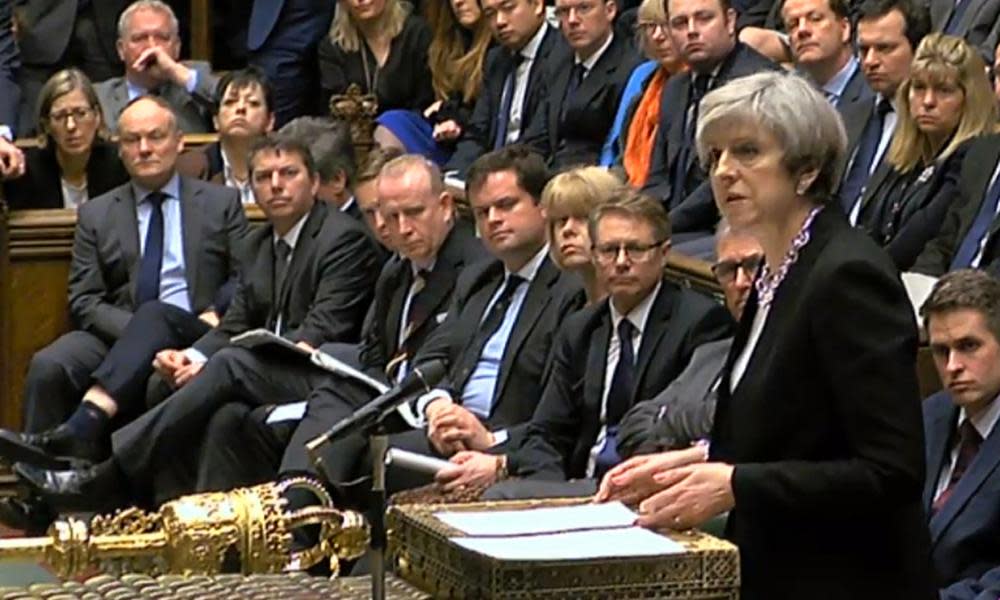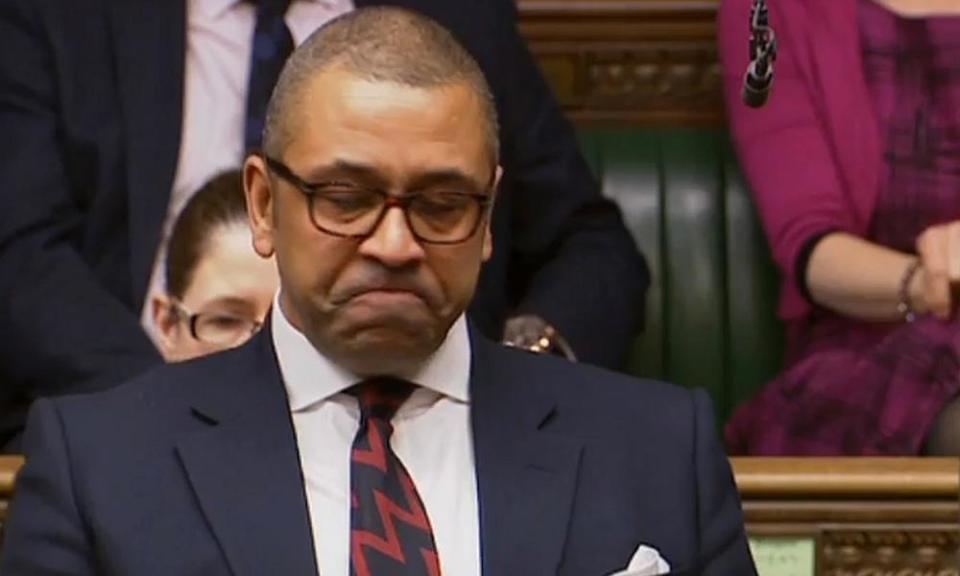Love, tolerance and defiance to the fore as MPs assemble | John Crace

The prime minister began her statement on Thursday with a measured act of defiance.
“Mr Speaker,” Theresa May said. “Yesterday an act of terrorism tried to silence our democracy. But today we meet as normal – as generations have done before us, and as future generations will continue to do – to deliver a simple message: we are not afraid.”
Only nothing about this was normal. As I arrived in parliament, the streets were still sealed off, while inside New Palace Yard a temporary plastic tent was still covering the spot where PC Keith Palmer had died.
A bombproof ministerial car, cordoned off with crime scene tape, remained parked next to the members’ entrance. It was one of the defence secretary’s bodyguards who is believed to have shot the terrorist.
By Carriage Gates, a team of forensic scientists in light blue contamination suits were on their knees conducting an inch by inch search of the entrance to the Palace of Westminster; their progress was meticulous and painfully slow.
At 9.33am, they all stood with heads bowed to observe a minute’s silence before resuming their search. It was only an hour or so later that the plastic tent was finally removed. The courtyard seemed somehow bare without its unwanted memorial.
There was nothing normal about what was taking place inside parliament either. On a Thursday morning featuring ministerial questions on international trade, the Commons usually has just a handful of MPs inside. Most seem to find an hour with Liam Fox entirely missable.
On this day, though, it was almost full for the minute’s silence that took place immediately after the prayers that always occur before the day’s proceedings.
Many left immediately afterwards, but even so the house was far more crowded than usual. And far quieter. MPs listened to one another with courtesy and didn’t even object when ministers made no effort to answer their questions. It won’t last, but it was a welcome change.
It was standing room only an hour later as May rose to make her statement on the terrorist attack.
Often the prime minister manages to misjudge the big occasions, appearing to be lacking in both grace and warmth, but this time she was note perfect: calm and informative; dignified with a hint of steel.
She paid tribute to the victims, praised the security services and Conservative MP Tobias Ellwood (who had tried to save the dying policeman), revealed that the attacker was British-born – a direct rebuttal of Leave.EU’s insistence that immigration was to blame – and called for unity and a reaffirmation of Britain’s open and democratic values.
In response, the Labour leader Jeremy Corbyn also rose to the occasion. He kept his speech short and to the point, reiterating much of what the prime minister had already said, while also welcoming the presence of the French foreign minister, Jean-Marc Ayrault, and Sylvie Bermann, the French ambassador to the UK, in the visitors’ gallery.
Ayrault stood up to acknowledge the British parliament. The French know all about terrorist attacks in their capital city. Shoulder to shoulder. Épaule contre épaule.
There wasn’t much more that anyone could add, but that didn’t mean it didn’t bear repetition. Sometimes parliamentary speeches are as much a necessary form of therapy as the mouthpiece of democracy.
Love, tolerance and a determination not to give in to Islamophobia were the watchwords of almost every speaker from all parties and there was little enthusiasm for Theresa Villiers’ suggestion that more police should be armed. That was something for a later date.

The one light-hearted moment came when Conservative MP Simon Hoare quoted a message from a London underground information board that read: “Terrorists are politely reminded that THIS IS LONDON and whatever you do to us we will drink tea and jolly well carry on.”
No one had the heart to point out that it was an internet creation, rather than a real handwritten rejoinder. The sentiment was what counted; it wasn’t a day for considering the irony of the only good news being fake news.
Conservative MP James Cleverly made the most moving contribution. He had known PC Palmer from when they were both in the army together and he was in tears as he remembered his old friend. Cleverly called for Palmer to be recognised with a posthumous award. May insisted Palmer would not be forgotten.
All the while, Ellwood stood at the back of the chamber, his arms crossed, holding his feelings in, as colleagues praised his actions.
He looked in pain, as if he would much rather be anywhere else but knew he couldn’t not be there.
As MPs drifted away, many, including Corbyn, stopped to touch his arm and thank him for what he had done. Ellwood half-smiled, but gave little away. Whatever he was thinking and feeling was for him and him alone.

 Yahoo News
Yahoo News 